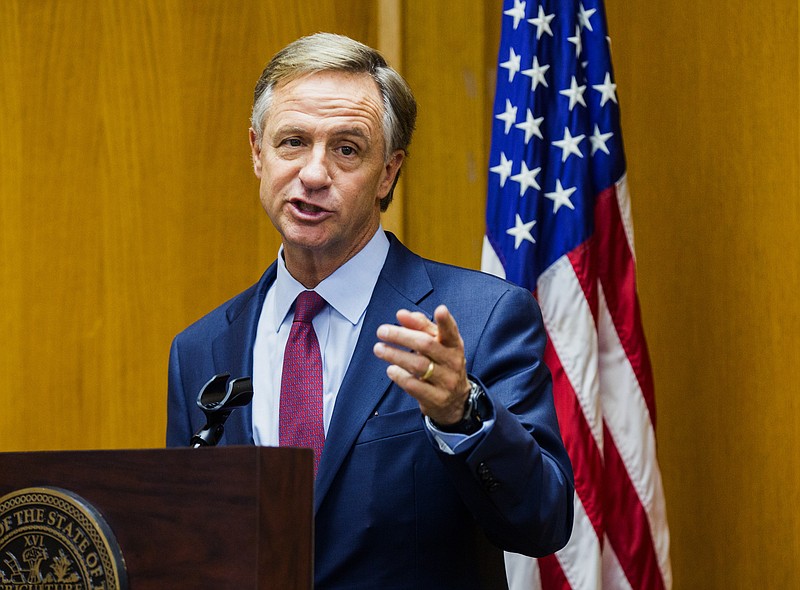NASHVILLE - Republican Gov. Bill Haslam's State of the State address Monday will lay out an ambitious agenda that includes selling skeptics in his own party on his push to boost fuel taxes to pay for better roads.
Haslam also will highlight his accompanying plan to offset the boost by cutting several other taxes supporting government responsibilities, such as public education, because of huge revenue surpluses.
He hopes to soothe fellow Republicans' concerns about his proposal to boost taxes by 7 cents per gallon on gas and 12 cents for diesel, part of a $296 million package to address an estimated $10.5 billion backlog of nearly 1,000 interstate, highway and road projects.
Last week, Haslam sought to set his message that the combination of transportation-related tax increases and cuts to the state's sales tax on food and on manufacturers' business taxes won't change state finances' bottom line.
"Today we're the lowest-tax state in the country, even after we do this we will still be the lowest-tax state in the country," Haslam told reporters in Memphis.
The State of the State gives Tennessee governors a high-profile stage where they can make the case for their priorities to the 33 senators and 99 representatives and state residents.
Haslam's speech coincides with the release of his proposed 2017-2018 spending plan, estimated at $34 billion to $35 billion.
The governor's press secretary, Jennifer Donnals, said he will "promote several initiatives including his comprehensive and strategic plan to cut taxes on food and manufacturing while updating how the state provides Tennesseans the safe and reliable transportation network needed to support future job growth."
The governor "will also talk about a responsible path to improve access to broadband for rural Tennesseans," Donnals said. "And, as he has shown throughout his administration, education will remain a top priority."
Haslam has proposed cutting $270 million in state taxes. A 0.5 percent reduction in grocery sales taxes would save consumers $55 million, and cutting corporate income taxes for manufacturers would cost the state $113 million in revenue.
He calls for speeding up the phase-out of the Hall income tax on investments and repay $120 million to the highway fund for money taken by past administrations to plug budget holes.
Some Republican lawmakers hope to avoid a fuel tax increase by using general fund revenue for the highway fund. Others are seeking even deeper tax cuts than Haslam proposes in the general fund.
But Haslam has first crack at the bat. Here are some expected and likely Haslam's priorities in other areas:
- Public K-12 education: The governor said in December that teachers can expect another salary boost as he seeks to make Tennessee the fastest- improving state in the nation in teacher pay. In each of the last two years he's put in about $100 million.
But even with a projected $1 billion surplus in one-time money and nearly $900 million in recurring revenue this year the governor doesn't want to put the state out on a limb in case revenues fall off in future years.
Education Commissioner Candice McQueen, meanwhile, is asking for an extra $48 million for the state's Basic Education Program, which pays the state's share of money for local schools. The administration is defending itself against multiple lawsuits charging the state isn't meeting a constitutional requirement to provide adequate support to locals.
- Higher education: Over the past three years, Haslam has upped support for Tennessee's public colleges and universities, reversing a trend where state support fell and sparked major annual tuition increases over a decade.
The University of Tennessee and Tennessee Board of Regents systems are asking for $48 million in Complete College Act funding in 2017. Other requests would bring the total sought to $94.4 million annually.
- The $11.3 billion Tenn–Care program for low- income women and children projects it will need an additional half a billion dollars. The program is jointly funded by the state and federal governments.
Tennessee's share is $191.39 million, with medical inflation and utilization accounting for $40 million. There's also $72 million for increased pharmacy costs for senior citizens eligible for both Medicaid and Medicare.
The Department of Correction faces problems, including an outbreak of Hepatitis C that prisoner advocates charged departmental officials have largely ignored. The department is asking $4 million for that alone.
That's not even counting annual employee pay raises, increases for employee insurance, ensuring the pension plan is on sound financial footing and bolstering the state's Rainy Day emergency fund and other budget demands.
